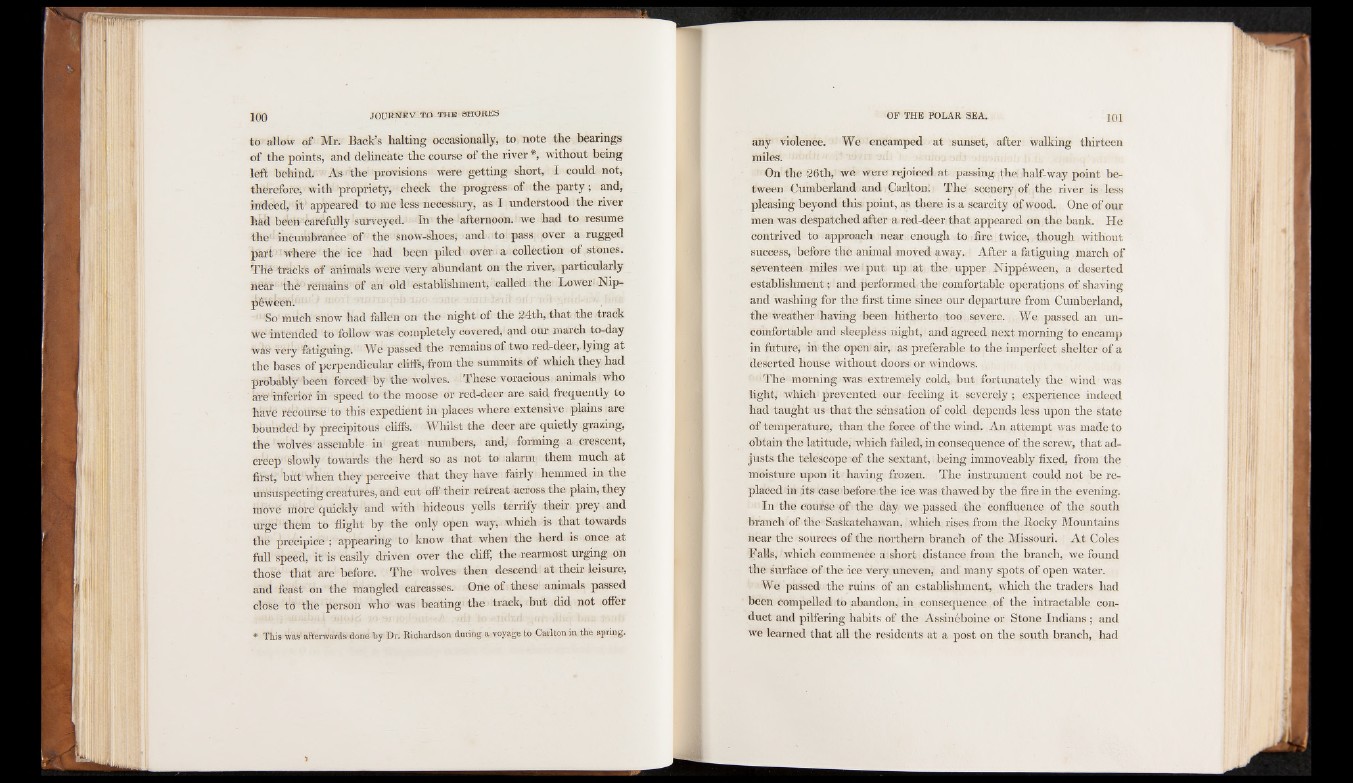
to allow of Mr. Back’s halting occasionally, to note the bearings
of the points, and delineate the course of the river *, without being
left behind. As the provisions were getting short, I could not,
therefore, with propriety, check the progress of the party; and,
indeed, it appeared to me less necessary, as I understood the river
had been carefully surveyed. In the afternoon, we had to resume
the incumbrance of the snow-shoes, and to pass over a rugged
part1'where the ice had been piled' over - a collection of stones.
Thé tracks of animals were very abundant on the river, particularly
near the remains of an old establishment, called the Lower NippéWtx'h'.
: ,
I) So much snow had fallen on the night of the 24th, that the track
we intended to follow was completely covered, and our march to-day
was' very fatiguing. We passed the remains of two red-deer,, lying at
the bases of perpendicular cliffs, from the summits-of which they had
probably been forced by the wolves. These voracious animals who
arfe inferior in speed to the moose or red-deer are said frequently to
haVé recourse to this expedient in places where extensive plains are
bounded by precipitous clifls. Whilst the deer are quietly grazing,
the wolves'assemble in great numbers, and, forming a crescent,
creep’ slowly towards the herd so as not to alarm them much at
first, but'when they perceive that they have fairly hemmed in the
unsuspecting creatures, and cut off their retreat across the plain, they
move more quickly and with hideous yells terrify their prey and
urgé them to flight by the only open way, which is that towards
the precipice ; appearing to know that when the herd is once at
full speed, it is easily driven over the cliff, the rearmost urging on
those that are before. The wolves then descend at their leisure,
and feast on the mangled carcasses. O n e of these animals passed
close td the person who was beating the track, but did not offer
* This was'afterwardvdone by Dr. Richardson daring a voyage to Carlton in the spring.
any violence. We encamped at sunset, after walking thirteen
miles.
On the 26th, we were rejoiced at passing the. half-way point between
Cumberland and Carlton. The scenery o f,the river is less
pleasing beyond this point, as there is a scarcity of wood. One of our
men was despatched after a red-deer that appeared on the bank. He
contrived to approach near enough to fire twice, though without
success, before the animal moved away. After a fatiguing march of
seventeen miles w e: put up at the upper Nippeween, a deserted
establishment; and performed the comfortable operations of shaving
and washing for the first time since our departure from Cumberland,
the weather having been hitherto too severe. We passed an uncomfortable
and sleepless night, and agreed next morning to encamp
in future, in the open air, as preferable to the imperfect shelter of a
deserted house without doors or windows.
' The morning was extremely cold, but fortunately the wind vras
light, which prevented our feeling it severely ; experience indeed
had taught us that the sensation of cold depends less upon the state
of temperature, than the force of the wind. An attempt was made to
obtain the latitude, which failed, in consequence of the screw, that adjusts
the telescope of the sextant, being immoveably fixed, from the
moisture upon it having frozen. The instrument could not be replaced
in its case before the ice was thawed by the fire in the evening.
In the course of the day we passed the confluence of the south
branch of the Saskatchawan, which rises from the Rocky Mountains
near the sources of the northern branch of the Missouri. At Coles
Falls, which commence a short distance from the branch, we found
the surface of the ice very uneven, and many spots of open water.
We passed the ruins of an establishment, which the traders had
been compelled to abandon, in consequence of the intractable conduct
and pilfering habits of the Assin6boine or Stone Indians ; and
we learned that all the residents at a post on the south branch, had